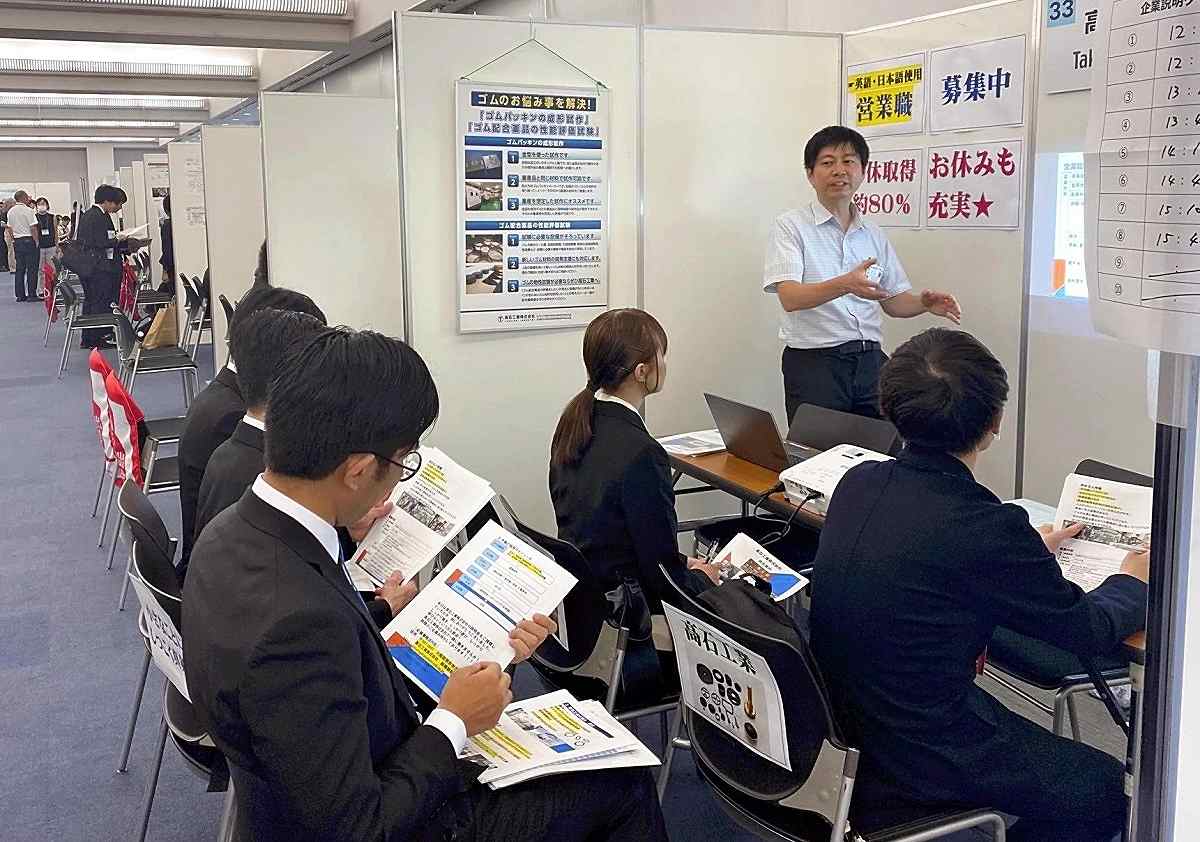Japanese Companies Increasing Efforts to Hire Foreign Students; Firms, Local Governments Help Them Acquire Skills to Find Jobs in Japan

Foreign students listen to briefing by a company official at a job matching event for foreign students in Osaka on Aug. 8.
20:00 JST, August 31, 2024
Amid a declining birth rate and attendant labor shortage, as well as the expansion of many businesses overseas, Japanese companies are increasingly seeking to hire foreign students who are studying at universities in Japan.
On top of this, an increasing number of local governments are trying to match foreign students with companies eager to recruit them.
Under these circumstances, the percentage of foreign students finding jobs in Japan exceeded 50% for the first time in fiscal 2022.
“Japanese companies provide good employee benefits,” said a Vietnamese student, a university senior in Kobe. “I want to connect Japan with my home country through my work.”
That student participated in a matching event held in Osaka City on Aug. 8, featuring 44 companies from the same prefecture. A fan of Japanese motor bikes and cars, the 25-year-old Vietnamese student came to Japan after graduating from high school. After studying at a Japanese language school, he advanced to a university and majored in finance in hopes of landing a marketing job in the manufacturing sector.
“Information about companies seeking foreign students is hard to come by, so I really appreciate having an event like this,” the student said.
The matching event was organized by the Osaka prefectural government. Several such events have been held since last year. In the August event, 255 students from 27 countries and regions, such as Vietnam, China and Nepal, attending mainly universities in the Kansai region, visited the booths of participating companies.
An increasing number of local governments are actively trying to connect local companies with local foreign students. The Ibaraki prefectural government on Aug. 23 established a group to promote recruitment of foreign students, with members including Ibaraki University, the University of Tsukuba and local business groups. This new organization will organize such events as internship programs and tours of companies in the prefecture.
In May, the Kanagawa prefectural government also opened a consultation service to support companies hiring foreign students.
Businesses expanding overseas
The new attention being paid to foreign students by businesses and local governments comes as the declining birth rate meets a post-COVID-19 increase in corporate recruitment activity, creating an environment in which companies are having a much harder time securing new graduates.
According to Recruit Co., among companies that hired graduates from the class of 2024, only 36.1% were able to achieve their initial recruitment plans. That figure was the lowest since Recruit began compiling this data with the class of 2012.
Takaishi Industry Co., based in the city of Ibaraki, Osaka Prefecture, last year began participating in matching events organized by the Osaka prefectural government, as this maker of precision rubber products had struggled to recruit Japanese college graduates. The company, which employs about 100 workers, has four factories in Japan and Vietnam.
This spring, Takaishi Industry hired two foreign students, including one Vietnamese postgraduate student from Osaka University, from one of these events.
“His ability to speak English and Japanese makes him an important asset who will be able to do a lot for us in Europe and the U.S. in the future,” said Junji Takaishi, the head of the administrative department of Takaishi Industry. “We would like to continue to hire talented people.”
“If we can pave a path for talented foreign students to be able to excel at Japanese companies, that will help us deal with the worsening labor shortage and support the development of companies in the prefecture,” an official with the Osaka prefectural government said.
Outflow of talented people
According to the Japan Student Services Organization, an independent administrative institute, and other organizations, the percentage of foreign students (excluding those who advanced to higher education within the country) who found jobs in Japan stood at a record 53.3% in fiscal 2022.
“In spite of the fact that they have gotten used to living in Japan and want to work here, many foreign students return home because it is hard for them to find a job here,” said Ai Ozawa, president of Vein Global, a company that supports recruitment of foreign students. “Talented people are flowing out of the country.”
One reason for this is that Japan has a unique framework for job hunting and recruitment, involving bulk hiring of new graduates, who have been visiting companies since early in their search.
According to a survey released in August by employment information firm Career-tasu, Inc. covering prospective 2025 graduates, most foreign students started job search activities in April of their senior year, about a year later than Japanese students. The survey also found only 46.1% of foreign students participated in employment-related activities such as internship programs, while 88.7% of Japanese students did so.
Overseas, most new graduates start hunting jobs around the time they graduate. “Foreign students don’t tend to have a good understanding of the Japanese timeline for job hunting and recruitment, and compared to natives they have a strong tendency to focus on studies and delay starting to look for a job,” said Ayumi Matsumoto, a researcher at Career-tasu. “If they are taught about recruitment in Japan, more talented workers will be able to excel here.”
Universities helping foreign students
Universities are also beginning to focus on supporting foreign students who hope to find jobs at Japanese companies. Waseda University last October started holding events to which they invite companies from various sectors such as auto manufacturing and electronics. The events cover students of all levels, including freshmen.
“We want foreign students, from as early as their freshman or sophomore year, to understand the difficulties involved in job hunting and the language proficiency they will need to work at Japanese companies and to think about how they are going to spend their school lives,” said a university official.
Chuo University held a guidance session in May to help foreign students apply for internship programs for the summer of their junior year. The university explained some unique aspects of the Japanese recruiting process to the foreign students, such as the fact that qualifications and good academic performances do not necessarily lead to job offers and that it is important to do self-assessment as well as research on industries and companies.
“It is important for local governments, universities and industry, among others. to clarify the division of roles and work on this matter,” said Gunma University Prof. Megumi Yuki, who is well-versed in employment issues faced by foreign students.
“With those three parties working together to help them find jobs, more foreign students would settle in Japan and more students overseas would be attracted to study in Japan,” Yuki added. “That would create a virtuous cycle.”
Related Tags
Top Articles in Business
-

Prudential Life Insurance Plans to Fully Compensate for Damages Caused by Fraudulent Actions Without Waiting for Third-Party Committee Review
-

Japan, U.S. Name 3 Inaugural Investment Projects; Reached Agreement After Considerable Difficulty
-

Japan’s Major Real Estate Firms Expanding Overseas Businesses to Secure Future Growth, Focusing on Europe, U.S., Asia
-

SoftBank Launches AI Service for Call Centers That Converts Harsh Customer Voices into Softer Voices
-

Green Tea Exports Hit Record High in 2025 Amid Growing Demand, Likely to Be Driving Force Behind Govt Export Target
JN ACCESS RANKING
-

Producer Behind Pop Group XG Arrested for Cocaine Possession
-

Japan PM Takaichi’s Cabinet Resigns en Masse
-

Man Infected with Measles Reportedly Dined at Restaurant in Tokyo Station
-

Israeli Ambassador to Japan Speaks about Japan’s Role in the Reconstruction of Gaza
-

Videos Plagiarized, Reposted with False Subtitles Claiming ‘Ryukyu Belongs to China’; Anti-China False Information Also Posted in Japan





















